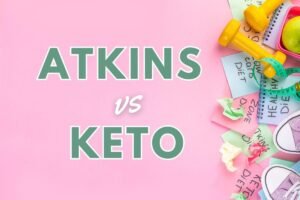Start your journey into the ketogenic diet, a diet high in fat and low in carbs. It’s known for helping with weight loss and boosting metabolic health. This guide will help you as you move towards a fat-burning and low-carb lifestyle.
The ketogenic diet focuses on nutritional ketosis. This is when your body learns to use fat for energy instead of carbs. By understanding this, you can improve your weight management and metabolic health.
Table of Contents
Key Takeaways
- Learn about the ketogenic diet and how it changes your body’s fat-burning.
- See how nutritional ketosis affects your health and well-being.
- Know the importance of healthy fats, protein, and carbohydrate restriction in this diet.
- Learn how the ketogenic diet and intermittent fasting work together for better results.
- Get the knowledge and strategies to make the ketogenic diet part of your daily life. Achieve lasting weight management and metabolic transformation.
Get Your Custom Keto Diet Plan Now
Understanding the Ketogenic Diet
The ketogenic diet focuses on high-fat and low-carb foods. It’s known for its health benefits. At its heart is nutritional ketosis. This is when the body uses fat and ketones instead of glucose for energy.

What is Nutritional Ketosis?
When you eat less than 50 grams of carbs a day, your body starts to change. It turns fat into ketones for energy. This makes your body good at burning fat for fuel. It can lead to many health benefits.
Benefits of a Keto Lifestyle
The keto diet has many health perks, including:
- Weight management: It helps with weight loss and keeping a healthy weight by boosting fat burning and reducing hunger.
- Improved insulin sensitivity: Eating fewer carbs can make insulin work better, which is key for metabolic health.
- Enhanced cognitive function: Ketones are a better energy source for the brain. This can improve focus, memory, and thinking skills.
- Reduced inflammation: The keto diet focuses on healthy fats and cuts down on carbs that cause inflammation.
Learning about nutritional ketosis and keto’s benefits helps people decide if it’s right for them. It can be part of a healthy lifestyle.
Ketogenic Diet Fundamentals
Learning the basics of the ketogenic diet is crucial for a smooth switch to a low-carb lifestyle. This change can lead to better weight management and metabolic health. The diet focuses on nutritional ketosis, making your body use healthy fats for energy.
The keto diet suggests eating mostly healthy fats for 70-80% of your daily calories. Add 15-20% for protein and just 5-10% for carbs. This mix helps your body enter ketosis, burning fat for energy instead of glucose.
Switching from a carb-heavy diet to a fat-focused keto lifestyle can be tough. You might feel tired, have headaches, or experience “keto flu” as your body adjusts. But with the right approach and patience, you can get through this phase and enjoy a steady low-carb lifestyle.
Click Here to Get Your custom diet plan
| Macronutrient | Keto Diet Recommendation |
|---|---|
| Fats | 70-80% of total calories |
| Protein | 15-20% of total calories |
| Carbohydrates | 5-10% of total calories |
Knowing the basics of the ketogenic diet helps you make smart choices and plan your move to a fat-burning, low-carb lifestyle. This knowledge is key to a successful keto journey, helping you reach your health and weight management goals.
Healthy Fats: The Cornerstone of Keto
The ketogenic diet focuses on healthy fats as the main fuel for your body. This might seem odd at first, but it’s key to know the different fats and their benefits for keto success.
Monounsaturated and Polyunsaturated Fats
Monounsaturated and polyunsaturated fats are key in the keto diet. These healthy fats help with fat-burning and have many health perks. Avocados, nuts, and olive oil are full of monounsaturated fats. They help keep your heart healthy and lower the risk of chronic diseases.
On the other hand, polyunsaturated fats are in fatty fish, chia seeds, and walnuts. They’re packed with omega-3 fatty acids. These are vital for your brain and help control inflammation.
Saturated Fats and Dietary Cholesterol
Saturated fats and dietary cholesterol are not bad fats. They’re important for making hormones, fighting off infections, and getting fat-soluble vitamins. Just make sure to eat them in moderation and focus on healthy fats.
It’s important to balance the fats you eat. Use monounsaturated and polyunsaturated fats as the base of your diet. Add saturated fats and dietary cholesterol in small amounts. This way, you’ll boost your fat-burning and overall health.
Protein: Finding the Right Balance
Protein is key for a healthy keto lifestyle. But, it’s important to balance your protein intake right. This ensures your body can go into and stay in a state of nutritional ketosis. Too much protein can mess with your weight and metabolic health goals on the keto diet.
Tracking Protein Intake
It’s vital to track and monitor your daily protein intake. This keeps your macronutrient balance right. You want carbs to be low and fats high.
Here are tips to track your protein on the keto diet:
- Use a food tracking app or journal to log your daily protein intake, along with your overall macronutrient ratios.
- Aim for a moderate protein intake, typically around 0.6-1 gram of protein per pound of your ideal body weight. Adjust this range based on your individual needs and goals.
- Be mindful of high-protein foods, such as meat, eggs, and dairy, and portion them appropriately to avoid overconsumption.
- Incorporate a variety of protein sources, including plant-based options like nuts, seeds, and low-carb vegetables, to ensure you’re getting a balanced intake.
By tracking your protein intake and keeping the right balance, you help your body enter and stay in nutritional ketosis. This supports your weight management and metabolic health.
| Macronutrient | Recommended Intake Range |
|---|---|
| Protein | 0.6-1 gram per pound of ideal body weight |
| Fat | 60-80% of total daily caloric intake |
| Carbohydrates | 5-10% of total daily caloric intake |
Carbohydrates: The Keto Restriction
On a ketogenic diet, carbohydrates play a big role. To stay in a fat-burning state, you need to limit your carb intake. Learning about net carbs and good carb sources is key to a low-carb lifestyle and weight management.
The keto diet cuts down on carbs a lot, aiming for 20-50 grams a day. Net carbs are total carbs minus fiber and sugar alcohols. These last two don’t raise blood sugar much, so you can eat more of them on keto.
When on keto, eat lots of low-carb veggies like leafy greens and berries. These give you important vitamins and antioxidants without adding too many carbs. Avoid starchy carbs like grains and legumes as they can stop your body from burning fat.
| Food Group | Recommended Intake on Keto | Examples |
|---|---|---|
| Non-starchy Vegetables | Unlimited | Spinach, kale, broccoli, cauliflower, zucchini |
| Berries | Moderate (1/2 – 1 cup per day) | Raspberries, blackberries, blueberries |
| Starchy Carbohydrates | Limit or Avoid | Grains, legumes, root vegetables |
Keep an eye on your carb intake and choose foods that are low in carbs but high in nutrients. This helps your body switch to ketosis, a state where it uses fat for energy. This is key to the keto diet’s benefits for weight and health.
Getting good at limiting carbs is key to the keto lifestyle. With the right approach, you can use this diet to reach your weight goals and boost your metabolic health.
Ketogenic Diet and Weight Management
The ketogenic diet is a strong tool for managing weight and improving metabolic health. It changes the body to use fat for energy instead of carbs. This leads to many benefits for those wanting to lose weight and improve their health.
Fat Adaptation and Metabolic Health
One big plus of the ketogenic diet is fat adaptation. When carbs are cut out, the body learns to use fat for energy. This switch helps with fat burning and boosts metabolic health.
- Increased energy levels and mental clarity
- Reduced feelings of hunger and cravings
- Improved body composition and fat loss
- Enhanced insulin sensitivity and glycemic control
- Reduced risk of chronic conditions like type 2 diabetes and cardiovascular disease
Following a ketogenic diet makes you feel fuller and more energetic. You might eat less naturally, which helps with weight loss. This diet doesn’t make you feel like you’re missing out like other diets do.
The diet also helps with metabolic health in many ways. It makes insulin work better and lowers inflammation. This can lower the risk of chronic diseases, making it a good choice for long-term health.
“The ketogenic diet is not just about weight loss; it’s about optimizing your metabolic health for a better quality of life.”
The ketogenic diet is great for managing weight and improving metabolic health. It’s a way to take control of your health and start a journey to better weight management and metabolic function.
Ketogenic Diet and Intermittent Fasting
The ketogenic diet and intermittent fasting work well together to help with weight management and metabolic health. When you combine these, you get better fat burning, improved insulin sensitivity, and more cellular repair.
Adding intermittent fasting to a ketogenic diet helps you enter a state of nutritional ketosis faster. When you fast, your body uses fat for energy, which helps keep the ketogenic state. This combo leads to faster weight loss and better metabolic health.
This mix also boosts your metabolic health overall. Intermittent fasting makes insulin more sensitive, which is good for blood sugar levels and lowers the risk of type 2 diabetes. The ketogenic diet also helps keep blood sugar stable and reduces inflammation. Together, they support long-term weight control and better metabolic health.
During fasting, your body does cellular repair, called autophagy. This process gets rid of damaged cells and helps your body renew itself. It can lead to better health and longer life.
“The combination of the ketogenic diet and intermittent fasting can be a powerful tool for weight management and metabolic health improvement.”
For the best results, find a balance that fits your needs and likes. Talk to a healthcare professional or a nutritionist to create a plan that safely combines the ketogenic diet and intermittent fasting.
| Benefit | Ketogenic Diet | Intermittent Fasting |
|---|---|---|
| Fat Burning | Promotes fat adaptation and ketosis | Enhances fat mobilization during fasted state |
| Insulin Sensitivity | Helps stabilize blood sugar and reduce insulin resistance | Improves insulin sensitivity and glucose metabolism |
| Cellular Repair | Supports anti-inflammatory processes | Enhances autophagy and cellular renewal |
| Weight Management | Aids in sustainable weight loss and maintenance | Supports calorie restriction and metabolic flexibility |
Using the ketogenic diet and intermittent fasting together can change how you manage weight and improve metabolic health. Start this journey with patience, consistency, and an understanding of your body’s needs.
Conclusion
The ketogenic diet is a powerful way to lose weight and boost your metabolic health. It focuses on eating healthy fats and the right balance of nutrients. This can help you start a journey to fat-burning and better metabolic health.
Success comes from understanding the basics, making the low-carb lifestyle fit your needs, and sticking to the strategies in this guide.
Adding the ketogenic diet to your life can bring many health benefits. You’ll see better weight management, more energy, and sharper thinking. By eating more healthy fats and less carbohydrate, you’ll feel the effects of nutritional ketosis. This leads to a healthier metabolic health.
Keep exploring the ketogenic diet and find what works best for you. Try different meal plans and see what suits your body and life. With hard work and a flexible mindset, you can fully benefit from this low-carb lifestyle. This can help you reach your health and wellness goals.




